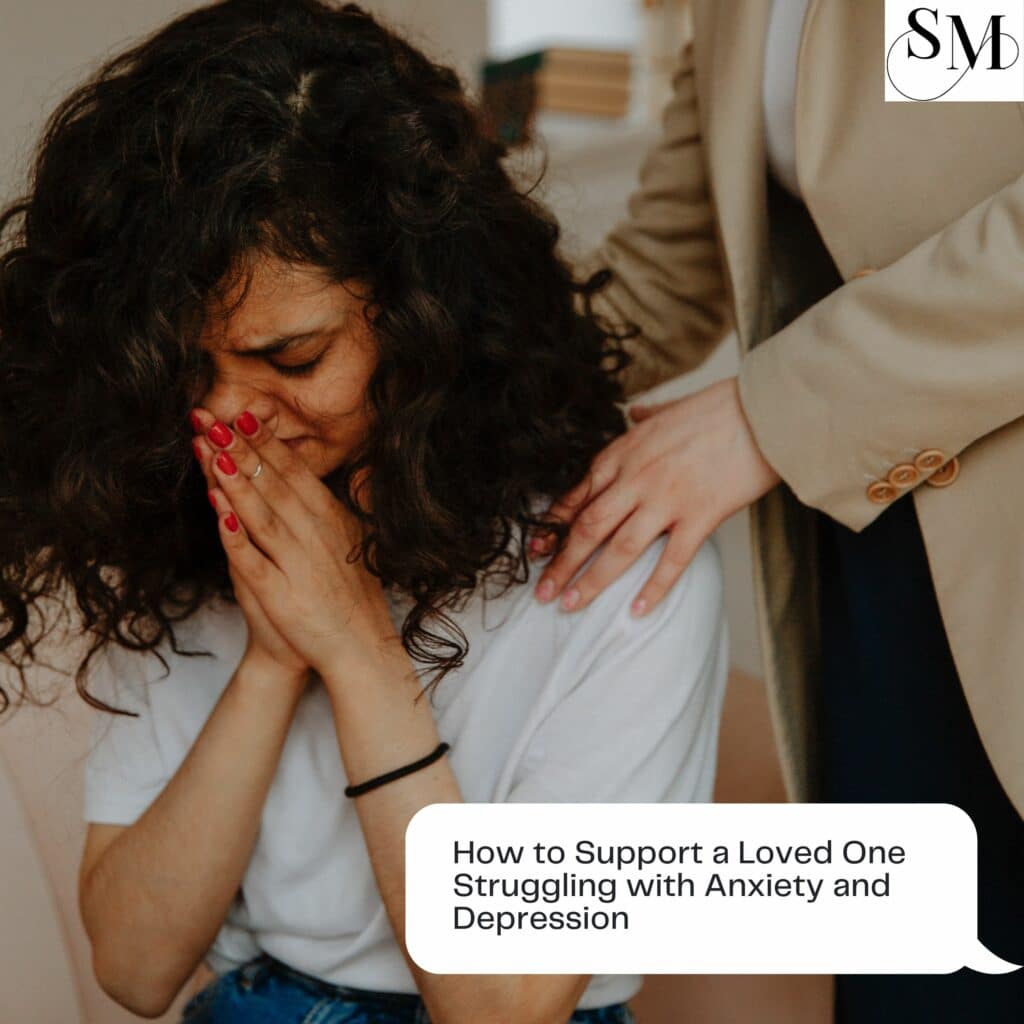When someone we care about is struggling with anxiety and depression, it can be challenging to know how to help. These mental health conditions can be overwhelming, both for the person experiencing them and for their loved ones. However, your support can make a significant difference in their journey toward healing. This blog will explore effective ways to support a loved one facing anxiety and depression, helping them feel understood and empowered.

Understanding Anxiety and Depression
Before you can effectively support someone, it’s essential to understand what they are going through. Anxiety and depression are distinct but often overlapping conditions:
- Anxiety involves excessive worry, fear, or apprehension about future events. It can lead to physical symptoms such as restlessness, rapid heartbeat, and difficulty concentrating.
- Depression is characterized by persistent feelings of sadness, hopelessness, and a lack of interest or pleasure in activities once enjoyed. It can lead to significant changes in appetite, sleep, and energy levels.
Recognizing the signs and symptoms of these conditions can help you approach your loved one with empathy and compassion.
1. Be There to Listen
One of the most crucial things you can do is to be present and listen. Allow your loved one to express their feelings without judgment or interruption. Create a safe space where they can share their thoughts openly. Remember, they may not always know how to articulate their feelings, so be patient and attentive.
Tips for Active Listening:
- Maintain eye contact and give your full attention.
- Avoid interrupting or offering immediate solutions.
- Validate their feelings by acknowledging their struggles and emotions.
2. Offer Your Support, Not Solutions
While it’s natural to want to fix things, often the best support you can provide is simply being there. Encourage your loved one to talk about their experiences, but refrain from trying to solve their problems unless they ask for advice. Instead, offer reassurance and remind them that it’s okay to feel this way.
Ways to Offer Support:
- Ask how you can help: “What can I do to support you right now?”
- Remind them that they are not alone in their struggles.
- Offer to accompany them to therapy sessions or doctor appointments if they feel comfortable.
3. Encourage Professional Help
While your support is valuable, professional help is often necessary for dealing with anxiety and depression. Encourage your loved one to seek help from a mental health professional. You can offer to help them find a therapist or counselor, or even assist in scheduling an appointment.
How to Encourage Professional Help:
- Share the benefits of therapy: “Talking to someone can really help you process what you’re going through.”
- Normalize seeking help: “Many people see therapists, and it can be a great resource.”
4. Educate Yourself
Understanding anxiety and depression can equip you with the knowledge needed to support your loved one effectively. Read about their conditions, common symptoms, and treatment options. This understanding can help you approach the situation with empathy and patience.
Resources for Education:
- Books on mental health and coping strategies
- Articles and reputable websites that discuss anxiety and depression
- Support groups and forums where you can learn from others’ experiences
5. Encourage Healthy Coping Mechanisms
Help your loved one find healthy ways to cope with their anxiety and depression. Encourage activities that promote mental well-being, such as:
- Physical activity: Exercise can significantly reduce symptoms of anxiety and depression.
- Mindfulness and relaxation techniques: Practices like meditation, yoga, or deep breathing can help alleviate stress.
- Creative outlets: Encourage hobbies like painting, writing, or music, which can serve as emotional outlets.
6. Check In Regularly
Ongoing support is vital. Regularly check in with your loved one to see how they are doing. Small gestures, like sending a text message, making a phone call, or arranging a coffee date, can show that you care and are thinking about them.
Ideas for Checking In:
- “Hey, just wanted to see how you’re feeling today. I’m here if you want to talk.”
- “Would you like to grab coffee or go for a walk? I’d love to spend some time together.”
7. Take Care of Yourself
Supporting someone with anxiety and depression can be emotionally taxing. It’s crucial to prioritize your own mental health as well. Make sure you are practicing self-care and seeking support when needed. This balance will allow you to be a more effective support system for your loved one.
Self-Care Tips:
- Set boundaries to ensure you don’t become overwhelmed.
- Engage in activities that rejuvenate you, such as hobbies, exercise, or spending time with friends.
- Consider talking to a professional if you find yourself struggling.
Conclusion
Supporting a loved one with anxiety and depression can be a challenging journey, but it’s also an opportunity to strengthen your bond. By educating yourself, listening actively, encouraging professional help, and engaging in healthy activities together, you can make a significant difference in their life.
If any of your loved ones are suffering from depression or anxiety, consider reaching out for professional help. You can take counseling sessions from Surbhi Manocha, a counselor based in Meerut, who also provides online counseling to individuals in need. Your support, combined with professional guidance, can help them on the path to recovery.
